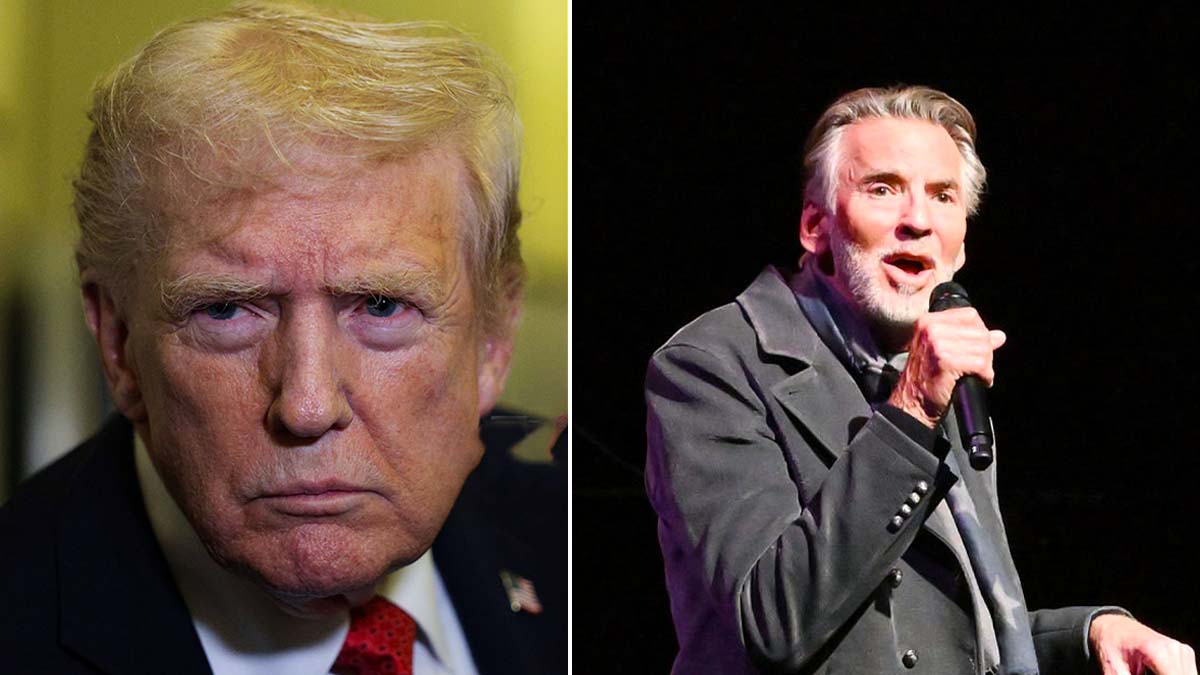Legendary singer-songwriter Kenny Loggins demanded President Donald Trump immediately remove his iconic 1986 hit “Danger Zone” from a grotesque AI-generated video mocking nationwide “No Kings” protests.
The 77-year-old artist, best known for his soaring anthems in films like Top Gun and Footloose, labeled the unauthorized use a blatant act of division, reigniting debates over copyright, free speech, and the weaponization of pop culture in America’s polarized landscape.
The controversy erupted late Saturday when Trump shared the 19-second clip on Truth Social and the White House’s Rapid Response X account, amassing millions of views within hours. Set against the pulsating guitar riffs of “Danger Zone” – the adrenaline-fueled track from Top Gun that propelled Tom Cruise’s Maverick into the stratosphere – the video depicts an animated Trump, donned in a golden crown, piloting an F-18 fighter jet emblazoned with “KING TRUMP.” As the jet soars over a bustling Times Square teeming with protesters, it unleashes a torrent of brown sludge – unmistakably fecal matter – onto the crowd below. Among the drenched demonstrators is a recognizable likeness of young Democratic activist Harry Sisson, waving a sign decrying authoritarianism.
The post was Trump’s cheeky retort to the “No Kings” demonstrations that swept the nation on October 18, drawing an estimated 7 million participants across more than 2,700 events in all 50 states. Organized by pro-democracy groups like Indivisible and the ACLU, the rallies decried Trump’s administration for alleged erosions of civil liberties, including crackdowns on free speech, state autonomy, and voting rights. Chants of “No Kings, No Dictators!” echoed from New York City’s rain-soaked streets to sun-baked Los Angeles boulevards, with celebrities like Jon Bon Jovi, Pedro Pascal, and Kerry Washington joining the throngs. Organizers hailed it as the largest single-day mobilization since the 2017 Women’s March, emphasizing nonviolence amid warnings of potential agitator infiltration.
Loggins, whose soft-rock legacy includes Grammy-nominated gems like “This Is It” and “I’m Alright,” wasted no time condemning the repurposing of his work. In a statement released Monday via his official website and social media, shared exclusively with Variety, the Santa Barbara resident wrote: “This is an unauthorized use of my performance of ‘Danger Zone.’ Nobody asked me for my permission, which I would have denied, and I request that my recording on this video is removed immediately. I can’t imagine why anybody would want their music used or associated with something created with the sole purpose of dividing us. Too many people are trying to tear us apart, and we need to find new ways to come together. We’re all Americans, and we’re all patriotic. There is no ‘us and them’ – that’s not who we are, nor is it what we should be. It’s all of us. We’re in this together, and it is my hope that we can embrace music as a way of celebrating and uniting each and every one of us.”
The statement struck a chord with fans and fellow artists, who flooded X with messages of support. “Thank you, Kenny, for standing up against this trash,” tweeted progressive influencer @JerZFyreFighter, garnering over 5,000 likes. Music journalist @Anselmusica echoed the sentiment in Spanish: “Trump se apropia, otra vez, de la creación sin permiso” – translating to “Trump appropriates, once again, without permission.” Loggins’ plea aligns him with a roster of icons who’ve rebuffed Trump’s rallies, including Beyoncé (“Formation”), the Rolling Stones (“You Can’t Always Get What You Want”), and Rihanna (“Don’t Stop the Music”). In 2018, Loggins sold publishing rights to his catalog, but he retains performance copyrights, empowering his demand.
As of Tuesday morning, the video remained online, prompting Loggins’ team to file formal copyright complaints with X (formerly Twitter) and Truth Social. Legal experts predict a swift takedown, citing fair use precedents that rarely shield political satire involving commercial tracks. “This isn’t commentary; it’s crude appropriation,” said entertainment attorney Dina LaPolt, who represented Loggins in past disputes. Unverified rumors swirled on X of a $500 million lawsuit, but sources close to the singer dismissed them as “exaggerated clickbait,” with Loggins prioritizing removal over litigation.
Trump’s camp offered no direct apology. Queried by NPR and Rolling Stone, a White House spokesperson fired back with a Top Gun meme featuring Cruise and Anthony Edwards as Maverick and Goose, captioned: “I feel the need for speed.” The quip drew eye-rolls from critics but chuckles from MAGA loyalists. On X, Trump supporters piled on Loggins, dubbing him a “has-been crybaby” and mocking his age with plastic surgery jabs. Breitbart framed it as “pathetic whining,” while conservative meme accounts amplified the video with captions like “One does not question the King.”
The backlash underscores broader tensions over AI’s role in politics. The clip, watermarked by an anonymous creator, highlights how deepfakes can amplify vitriol, blurring lines between humor and harassment. “No Kings” co-founder Ezra Levin called it “disgusting and dangerous,” linking it to Trump’s “king-like” rhetoric. Trump, in a Fox News interview Sunday, brushed off the protests: “I’m not a king at all – just the people’s champion.” Yet, the video’s virality – over 10 million impressions – has only fueled the fire, with international echoes in Berlin and London solidarity marches.
For Loggins, a Navy veteran and lifelong unity advocate, the episode is personal. “Music should lift us, not drop bombs,” he told Deadline in a follow-up. As the nation grapples with division, his stand serves as a reminder: even in the danger zone of democracy, harmony might yet prevail. Will platforms comply? And could this spark a broader artist boycott? Stay tuned – the afterburners are just igniting.
